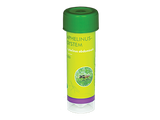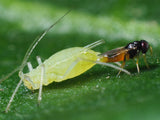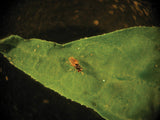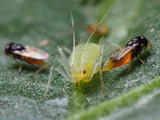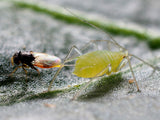Aphelinus-System
Reliable predator against large aphid species
What is Aphelinus-System?- The parasitic wasp Aphelinus abdominales against several large aphid species and Myzus species
- Frequently used biological control agent of the potato aphid Macrosiphum euphorbiae and the buttercup aphid Aulacorthum solani
- Not obstructed by hyperparasites, whereas this can be the case with other parasitic wasps during the summer months
- Long-term activity compared to other aphid controllers
- Parasitize larger and winged aphids
- Important contribution to biological control of small aphids through host feeding, also on aphids which they do not parasitize
- More resistant to summer temperatures than other parasitic species
- Do not swarm out, so that they stay locally active
- Female parasitic wasp puncture the host and lay an egg
- 1 parasitic wasp parasitizes 5 to 10 aphids a day
- Optimal parasitic capacity is reached from the third day and is maintained for up to 3 weeks
- In this way they can parasitize up to 250 aphids
- The parasitic wasps parasitize adults and nymphs
- Parasitized aphids change into black mummies
- Vegetable crops such as tomato, pepper, eggplant and runner beans
- Ornamental crops such as gerbera, rose and chrysanthemum
Units
Aphelinus-System-250
Packaging: 30 ml plastic tube
Contents: 250 mummies
Carrier: buckwheat
Aphelinus-System-1.000
Packaging: 100 ml plastic tube
Contents: 1.000 mummies
Carrier: buckwheat
Relevant crops
- Strawberry
- Medicinal cannabis
- Anthurium
- Tree and shrub nursery
- Tomato and Cherry tomato
- Sweet pepper and Hot pepper
- Roses
- Melon and Watermelon
- Gerbera
- Eggplant (aubergine)
- Cucumber and Gherkin
- Chrysanthemum
Relevant pests and diseases
Aphids










